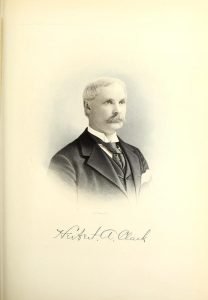Maj. Herbert Allyne Clark (deceased), of Attleboro, Mass., who in recent years was Regimental Quartermaster of the United States Volunteer Army, and a man widely known, was the only surviving son of Samuel W. and Charity H. (Cushman) Clark, and was born in Middleboro, Mass., Feb. 22, 1859. He was descended from the earliest Puritan stock, his maternal ancestor being Robert Cushman, the financial agent of the Plymouth Colony, who joined the Pilgrims in New England in 1621. His paternal ancestor, John Clark, came to Plymouth about 1623, and besides these he was related by ancestral ties to several of the prominent families of the Massachusetts settlements, including that of Gov. William Bradford. His grandfathers, Abisha T. Clark and Elias Cushman, were both respected farmers of Middleboro, where his father, Samuel W. Clark, followed the occupation of carpenter and builder until his death, in 1883, when he was aged sixty-two years. His mother, Charity H. (Cushman), survived her husband until Jan. 28, 1905.
Major Clark was educated in the Middleboro public and high schools, graduating from the latter in 1876. On Jan. 31, 1877, he went to Attleboro, Bristol county, and entered the jewelry manufacturing establishment of Horton, Angell & Co., with which firm he was ever afterward connected. This widely-known firm was established in 1870 by Edwin J. and Gideon M. Horton and Benjamin J. Angell, under the present style of Horton, Angell & Co., and from the first has been successfully engaged in the manufacture of men’s and women’s gold-plated goods, such as cuff and collar buttons, sets, etc., from the first quality rolled gold plate. It has gained a national reputation for the high standard workmanship of its product. As an apprentice during the period of a little more than three and one-half years Major Clark thoroughly mastered every detail and acquired a practical knowledge of the business, and in the autumn of 1880 was made superintendent. He filled this position for several years, becoming a partner in the concern Jan. 1, 1886. Edwin J. Horton had died, and had been succeeded by Maj. Everett S. Horton, his brother, a sketch of whom appears just above. Mr. Angell and Gideon M. Horton died in 1886 and Major Clark in 1903, but the firm name has remained unchanged.
In politics Major Clark was a stanch Republican, yet he never sought nor accepted public office. He was, however, one of the most energetic and public-spirited of citizens, taking a deep interest in all matters affecting the community at large, and liberally supporting every movement which promised reasonable benefit and general good. As a business man he displayed ability and sagacity of a high order, and was a director of the Attleboro Savings & Loan Association and of the Attleboro Mutual Fire Insurance Company.

Major Clark was prominently and actively connected with military affairs during the last decade and a half before his death. He became a member and sergeant of Company I, 5th Regiment, Massachusetts Volunteer Militia, at its organization in 1887, and was elected second lieutenant in 1889, first lieutenant in 1892, and captain in 1895. In 1897 lie was appointed inspector of rifle practice on the staff of Col. J. H. Whitney. The war between Spain and the United States brought him into the volunteer army as quartermaster of his regiment, which was mustered in as the 5th Massachusetts Volunteer Infantry, he being appointed quartermaster and mustered into service June 23, 1898. When the regiment was mustered out of the service, and Colonel Whitney was made general, Major Clark went to the brigade staff. Only a short time before his death he was offered a colonelcy on the staff of Governor Bates, but declined. Major Clark was a thorough soldier, an excellent disciplinarian, and popular with the officers and men. He was a thirty-second degree Mason, holding membership in Ezekiel Bates Lodge, King Hiram Chapter and Attleboro Council, of Attleboro; in Bristol Commandery, K. T., of North Attleboro; in Aleppo Temple, Nobles of the Mystic Shrine, of Boston; and in the Scottish. Bite bodies to and including the thirty-second degree, conferred upon him at Providence, R. I., in 1896. He was also a member of Orient Lodge and Gideon M. Horton Encampment, I. O. O. E., and of Pennington Lodge, A. O. U. W., all of Attleboro. Major Clark held membership in a number of jewelers’ organizations, and was a member of several leading clubs of Providence, among them the Pomham. In social as in military circles he held the highest positions and throughout New England and the country he had many friends and admirers.
Major Clark was never married, and to the close of his days was thoroughly devoted to his mother whose comfort was his first consideration, and whose welfare and happiness received his most loving thought.
Major Clark died Feb. 16, 1903, and was buried at Woodlawn cemetery, Attleboro. The only surviving member of the family is a sister, Mrs. James J. Horton, of Attleboro.
